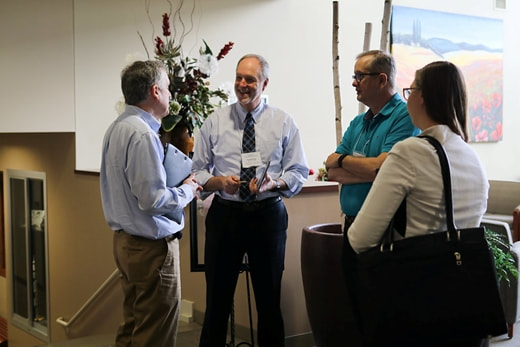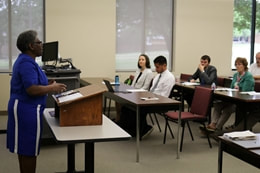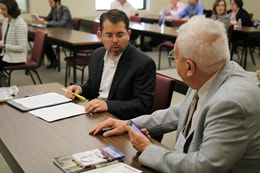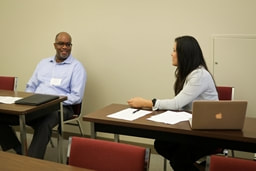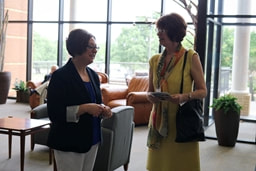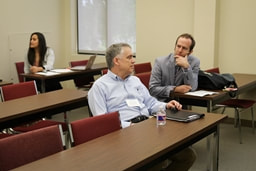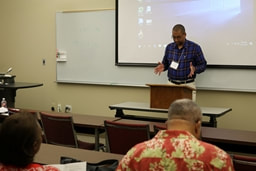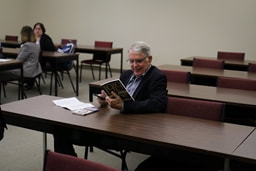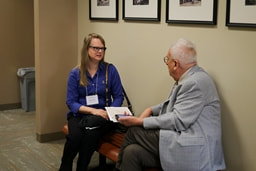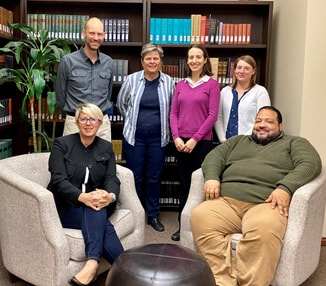2020
ASDAH Newsletter
The Newsletter of The Association of Seventh-day Adventist Historians
Editor: Sabrina Riley; President: Amy Rosenthal
Editor: Sabrina Riley; President: Amy Rosenthal
Report of the Ninth Triennial ASDAH Conference
Edward Allen
The Ninth Triennial Conference of the Association of Seventh-day Adventist Historians was held on the campus of Southwestern Adventist University in Keene, Texas, from May 16 to 19, 2019. The conference focused on themes related to the year 1919.
The conference began Thursday evening, May 16, with a keynote address by Kara Dixon Vuic from Texas Christian University on “The Greatest Mother in the World: American Women in the Great War.” It was a fascinating discussion of the place of women in promoting the American participation in World War I. Friday, May 17, was filled with nine breakout sections focusing on Adventism, race and ethnicity, missionaries, and the Sabbath. One of the outstanding presentations was by Kevin Burton who revealed the FBI’s investigation of Seventh-day Adventists during World War 1. Another notable presentation was by Lisa Clark Diller who discussed the doubts that Lillis and Orly Ford had during their first term of service in Peru. In the evening, Don McAdams, former president of Southwestern Adventist University and a renowned Adventist historian, gave a plenary address on Adventist historiography. It was a plea for a greater awareness of the context of Adventism.
For the second time in six years, severe weather prevented the planned Sabbath afternoon activity. Instead, members of the association spent time together in fellowship in the museum on the SWAU campus. When the threatening weather lifted, the group took a tour of the campus, including the relatively new nursing/administration building and the Dinosaur Science Museum.
The association business meeting met on Saturday evening, May 17. Durin
g the meeting there was considerable discussion of alternate timeframes for future association conferences. The next ASDAH Conference will be hosted by Southern Adventist University in 2022. For more information about decisions and discussions from the business meeting, click here to see the minutes .
The conference began Thursday evening, May 16, with a keynote address by Kara Dixon Vuic from Texas Christian University on “The Greatest Mother in the World: American Women in the Great War.” It was a fascinating discussion of the place of women in promoting the American participation in World War I. Friday, May 17, was filled with nine breakout sections focusing on Adventism, race and ethnicity, missionaries, and the Sabbath. One of the outstanding presentations was by Kevin Burton who revealed the FBI’s investigation of Seventh-day Adventists during World War 1. Another notable presentation was by Lisa Clark Diller who discussed the doubts that Lillis and Orly Ford had during their first term of service in Peru. In the evening, Don McAdams, former president of Southwestern Adventist University and a renowned Adventist historian, gave a plenary address on Adventist historiography. It was a plea for a greater awareness of the context of Adventism.
For the second time in six years, severe weather prevented the planned Sabbath afternoon activity. Instead, members of the association spent time together in fellowship in the museum on the SWAU campus. When the threatening weather lifted, the group took a tour of the campus, including the relatively new nursing/administration building and the Dinosaur Science Museum.
The association business meeting met on Saturday evening, May 17. Durin
g the meeting there was considerable discussion of alternate timeframes for future association conferences. The next ASDAH Conference will be hosted by Southern Adventist University in 2022. For more information about decisions and discussions from the business meeting, click here to see the minutes .
Encyclopedia of Seventh-day Adventists Update
Dragoslava Santrac
The Encyclopedia of Seventh-day Adventists (ESDA) website is set to launch at the 2020 General Conference Session with a minimum of 2,000 articles. It will be a free website. At the moment we have nearly 1,500 completed articles and 1,300 accompanying images from all of the world church’s divisions. However, launching the website in July is just the beginning.
The ESDA contains nearly 8,500 entries that need to be written on Adventist history, including articles pertaining to various crucial events, people, organizations, institutions, and distinctive teachings. Many articles are from world regions that were left out of the previous encyclopedia. The ESDA will present an international perspective because it draws on the expertise of hundreds of authors and editors worldwide. After the ESDA Online is launched this summer and the remaining articles in the database are completed, the ESDA website will be constantly updated and expanded as the Adventist Church grows.
The ESDA needs writers from all parts of the world to write articles on people and events in their territories. Some topics have little or no written documentation. But here is the exciting part: many ESDA articles will become foundational sources for future researchers. For more information about the ESDA and how you can contribute to it please see https://www.adventistarchives.org/encyclopedia, or email the ESDA editorial office at [email protected].
We invite researches, teachers, students, and members with expertise on many given subjects—not only history and theology scholars—to contribute articles. We welcome help in other areas, too, including peer reviewing, proofreading, conducting interviews to collect historical information based on traditions, and submitting missionary letters, photographs, and artifacts. Shorter versions of the ESDA articles are published in the ASTR newsletter (to subscribe to the ASTR newsletter, please write to [email protected]). Historical nuggets from the ESDA articles are shared on Twitter @EncyclopediaSDA and the ASTR Facebook page.
The ESDA contains nearly 8,500 entries that need to be written on Adventist history, including articles pertaining to various crucial events, people, organizations, institutions, and distinctive teachings. Many articles are from world regions that were left out of the previous encyclopedia. The ESDA will present an international perspective because it draws on the expertise of hundreds of authors and editors worldwide. After the ESDA Online is launched this summer and the remaining articles in the database are completed, the ESDA website will be constantly updated and expanded as the Adventist Church grows.
The ESDA needs writers from all parts of the world to write articles on people and events in their territories. Some topics have little or no written documentation. But here is the exciting part: many ESDA articles will become foundational sources for future researchers. For more information about the ESDA and how you can contribute to it please see https://www.adventistarchives.org/encyclopedia, or email the ESDA editorial office at [email protected].
We invite researches, teachers, students, and members with expertise on many given subjects—not only history and theology scholars—to contribute articles. We welcome help in other areas, too, including peer reviewing, proofreading, conducting interviews to collect historical information based on traditions, and submitting missionary letters, photographs, and artifacts. Shorter versions of the ESDA articles are published in the ASTR newsletter (to subscribe to the ASTR newsletter, please write to [email protected]). Historical nuggets from the ESDA articles are shared on Twitter @EncyclopediaSDA and the ASTR Facebook page.
Institutional News
Union College
Union's history department experienced dramatic transformations in the autumn of 2015. Benjamin Tyner defended his dissertation at the Graduate Center, CUNY. Christopher Banks joined the faculty to create an international relations program and to teach a variety of world regional history courses. George Gibson retired after many decades teaching American history at Union College. Many generations of colleagues and students were profoundly influenced by George's kindness and generosity, mischievous sense of humor, and delight in political debate. One of those students honored him by funding the George Gibson Lecture Series, a semi-annual keynote lecture on relevant historical and political topics hosted by Union for the campus and for the general public. As we enter 2020, the study of history at Union College feels joyfully both vibrant and rooted: we are transforming to fit the needs and concerns of the present, populated by promising young minds, while we remain content in the meaningful consolations and traditions gathered from our collective past.
On the religious history side, Edward Allen, who chairs the Division of Religion at Union College, attended the Yale-Edinburgh Group on the History of the Missionary Movement and World Christianity at Edinburgh in June 2018. He presented a paper on “The Form and Function of Prayer in the Student Volunteer Movement 1886 to 1914.” He was invited to submit the paper for publication in the Edinburgh University Press publication Studies in World Christianity. The article was accepted and published last summer in Vol. 25, No. 2 ([August] 2019). He continues his research on Seventh-day Adventist participation in the Student Volunteer Movement and will be at the Yale University School of Divinity Library for three days in January 2020.
On the religious history side, Edward Allen, who chairs the Division of Religion at Union College, attended the Yale-Edinburgh Group on the History of the Missionary Movement and World Christianity at Edinburgh in June 2018. He presented a paper on “The Form and Function of Prayer in the Student Volunteer Movement 1886 to 1914.” He was invited to submit the paper for publication in the Edinburgh University Press publication Studies in World Christianity. The article was accepted and published last summer in Vol. 25, No. 2 ([August] 2019). He continues his research on Seventh-day Adventist participation in the Student Volunteer Movement and will be at the Yale University School of Divinity Library for three days in January 2020.
Walla Walla University
People News
Terrie Aamodt continues work on the Ellen White biography, and presented a paper at the ASDAH conference last spring on Ellen White and Methodism, which is part of her chapter on Ellen White’s religious background. As a result of the two seminars Aamodt attended in the summer of 2018 on Civil War/Reconstruction/Jim Crow visual culture, she is working on a project related to the Bloody Shirt visual narrative in illustrated magazines from the late nineteenth century, particularly Puck and Judge. She spent several days this fall working on that project in the New York Public Library. New scholarship on the Jim Crow era, including Henry Louis Gates, Jr.'s 2019 Stony the Road, led her to significantly adapt coverage of the post-Civil War period in her Civil War and Reconstruction upper division course. That work has also affected the content of her upper division general studies courses American History and Visual Culture and The African-American Experience.
Hilary Dickerson received a McAdams Grant in June 2019 and is using the money to fund trips to the archives in Washington, DC, pursuing research on B. P. Hoffman. She was already there in June and spent three days conducting research in Archives I. She will head back to DC in February or March to conduct research at the General Conference and Archives I and II.
Last October, Greg Dodds delivered the Roland Bainton Plenary Address at the 2018 Sixteenth Century Studies Conference. He was invited to participate in a roundtable on service beyond the academy at the 2019 Sixteenth Century Studies Conference. Dodds was also the invited speaker for the Rosario Alumni Weekend where he discussed the two books of revelation–Scripture and Nature–through three case studies: Galileo, Newton, and Darwin.
At the 2019 Renaissance Society of America Conference in Toronto, California, he presented a paper entitled “Regicide and the Rediscovery of Pre-Reformation Humanism.” During fall quarter 2019, on sabbatical, he completed and submitted an article for the journal Erasmus Studies.
Ron Graybill and Kevin Morgan have been creating literal, line for line, word for word scholarly transcriptions of the more than 200 pages of Ellen G. White holographs, which have been published in facsimile form in books, journals, and scholarly articles. Others in their collection are scans of Ellen G. White holographs in private hands or on display in Ellen White Research Centers and Branch Offices. The Graybill/Morgan transcriptions represent misspellings when they are clearly legible, record strikethroughs, and place interlined words in superscript. Copies of these holographs and the literal transcriptions thereof are being sent to interested scholars and may be obtained from [email protected].
Brian Strayer writes a weekly column (now in its third year) entitled “The Past Is Always Present” for The Journal Era [Berrien Springs, Michigan]. As a member of the Speakers Bureau at Andrews University, he regularly presents talks about Adventist heritage at camp meetings, schools, and local churches throughout the Midwest and New York. He is currently preparing lecture notes for two Adventist history tours: one for the Association of SDA Librarians to Battle Creek in June 2020 and the other for Michiana SDAs throughout Michigan in September 2020. In March, he joined a group of Adventist friends for a Norwegian Cruise Lines three-week tour of coastal Chile, Uruguay, and Argentina. He is currently working on a centennial history of Union Springs Academy (1921-2021) to be released in the fall of 2021. (You might want to buy a copy for your parents!) Strayer has just completed writing a 200+-page manuscript for the 170-year history of the Jackson Seventh-day Adventist church, the oldest continuously meeting Sabbath-keeping Adventist congregation in the world.
Monique Vincent co-directed the 2019 Balua Regional Archaeological Project excavations at Khirbat al-Balua last summer, taking one of the Walla Walla University history students with her. Vincent is associate editor for the final publication series of the Madaba Plains Project–Tall al-Umayri excavations. MPP8 was released in 2019 and MPP9 will be coming out February 2020.
Hilary Dickerson received a McAdams Grant in June 2019 and is using the money to fund trips to the archives in Washington, DC, pursuing research on B. P. Hoffman. She was already there in June and spent three days conducting research in Archives I. She will head back to DC in February or March to conduct research at the General Conference and Archives I and II.
Last October, Greg Dodds delivered the Roland Bainton Plenary Address at the 2018 Sixteenth Century Studies Conference. He was invited to participate in a roundtable on service beyond the academy at the 2019 Sixteenth Century Studies Conference. Dodds was also the invited speaker for the Rosario Alumni Weekend where he discussed the two books of revelation–Scripture and Nature–through three case studies: Galileo, Newton, and Darwin.
At the 2019 Renaissance Society of America Conference in Toronto, California, he presented a paper entitled “Regicide and the Rediscovery of Pre-Reformation Humanism.” During fall quarter 2019, on sabbatical, he completed and submitted an article for the journal Erasmus Studies.
Ron Graybill and Kevin Morgan have been creating literal, line for line, word for word scholarly transcriptions of the more than 200 pages of Ellen G. White holographs, which have been published in facsimile form in books, journals, and scholarly articles. Others in their collection are scans of Ellen G. White holographs in private hands or on display in Ellen White Research Centers and Branch Offices. The Graybill/Morgan transcriptions represent misspellings when they are clearly legible, record strikethroughs, and place interlined words in superscript. Copies of these holographs and the literal transcriptions thereof are being sent to interested scholars and may be obtained from [email protected].
Brian Strayer writes a weekly column (now in its third year) entitled “The Past Is Always Present” for The Journal Era [Berrien Springs, Michigan]. As a member of the Speakers Bureau at Andrews University, he regularly presents talks about Adventist heritage at camp meetings, schools, and local churches throughout the Midwest and New York. He is currently preparing lecture notes for two Adventist history tours: one for the Association of SDA Librarians to Battle Creek in June 2020 and the other for Michiana SDAs throughout Michigan in September 2020. In March, he joined a group of Adventist friends for a Norwegian Cruise Lines three-week tour of coastal Chile, Uruguay, and Argentina. He is currently working on a centennial history of Union Springs Academy (1921-2021) to be released in the fall of 2021. (You might want to buy a copy for your parents!) Strayer has just completed writing a 200+-page manuscript for the 170-year history of the Jackson Seventh-day Adventist church, the oldest continuously meeting Sabbath-keeping Adventist congregation in the world.
Monique Vincent co-directed the 2019 Balua Regional Archaeological Project excavations at Khirbat al-Balua last summer, taking one of the Walla Walla University history students with her. Vincent is associate editor for the final publication series of the Madaba Plains Project–Tall al-Umayri excavations. MPP8 was released in 2019 and MPP9 will be coming out February 2020.
Autumn 2019 saw a number of changes in Walla Walla’s history department. Terry Gottschall retired at the end of the summer and Monique Vincent was promoted to a full-time tenure track. Tonia Jeffrey is the new administrative assistant.
Adapting to new faculty and new areas of expertise, the history major has changed from dividing upper division courses between "American" and "European" to "American" and "World." Reflecting those changes, we now offer upper division courses in Asian history (Dickerson) and Ancient History (Vincent). These courses build on their respective lower division general studies courses in those fields. We also offer a lower division course in Middle Eastern history from the 7th century to the present. History majors and minors are both strong and up from last year. Greg Dodds will be leading a United Kingdom history tour this coming summer.
Our legal studies minor, superintended by philosophy professor Tim Golden, includes new courses in philosophy of law and history of social and political philosophy. Legal Studies minors are up.
Adapting to new faculty and new areas of expertise, the history major has changed from dividing upper division courses between "American" and "European" to "American" and "World." Reflecting those changes, we now offer upper division courses in Asian history (Dickerson) and Ancient History (Vincent). These courses build on their respective lower division general studies courses in those fields. We also offer a lower division course in Middle Eastern history from the 7th century to the present. History majors and minors are both strong and up from last year. Greg Dodds will be leading a United Kingdom history tour this coming summer.
Our legal studies minor, superintended by philosophy professor Tim Golden, includes new courses in philosophy of law and history of social and political philosophy. Legal Studies minors are up.
McAdams Grant Scholarship and Application
Southwestern Adventist University is now in its fifth year as host of the Dr. Donald R. and Anne P. McAdams Seventh-day Adventist History grants. Since its inception in December 2014, the grant board has awarded grants to 19 historians totaling more than $60,000. Grant funds are provided by Dr. and Mrs. McAdams with matching grants from the ExxonMobil Foundations.
Some grant recipients have been:
All scholars of Adventist history are invited to submit applications for research funding through the McAdams grant, which is intended to fund significant projects in Millerite and Adventist history that will result in publication. Scholars holding a Ph.D. in history (or related field) or who have demonstrated competence in the field of Adventist history are eligible to apply. Grants are not intended to aid research for completion of doctoral work, although funding may be available for scholars who are revising completed dissertations for publication. Grants will ordinarily be in the range of $3,000 to $10,000. Follow-up grants for large projects may be available.
Applicants should complete the application form (included here but also found at the ASDAH website, under Research Funding, which asks for a short description of the project. If a project is judged to be promising, the committee will ask for a fuller statement (1,200-2,000 words), including a proposed budget. Application letters should be sent to:
Steve Jones
Department of History
Southwestern Adventist University
100 W. Hillcrest, Keene, TX, 76059.
Deadlines for consideration in 2019 are April 1 and November 1. A selection committee (Steve Jones, Terrie Aamodt, Eric Anderson, and Jonathan Butler) will review applications and make recommendations.
The grant application form is below:
Some grant recipients have been:
- Jonathan Butler, who is working on Ellen G. White: A Cultural Biography. Butler used his grant to fund research trips to Berrien Springs for research in the Smith-Boyee and SpicerAndrews collections, and to Washington, D.C., to interview members of the White Estate. An offshoot of this research was Butler’s article “Seventh-day Adventist Historiography: A Work in Progress,” for Church History: Studies in Christianity and Culture.
- Ed Allen, who is researching Seventh-day Adventist participation in the Student Volunteer Movement for Foreign Missions (SVM). His research has taken him to the Adventist Archives in Washington DC, Walla Walla College, Pacific Union College, Andrews University, Washington Adventist University, Yale University, and Columbia University. From the visits to Andrews and Yale, Allen was able to gain a view of how broadly Adventists participated in the SVM. As a result of this research, he presented a paper at ASDAH 2016 entitled, “The Impact of the Student Volunteer Movement on the Seventh-day Adventist Church.”
- Gilbert Valentine, who is working on a biography of John Nevins Andrews. The grant enabled Valentine to complete a 650-page draft manuscript, John Nevins Andrews: Scholarly Missionary of the First Rank, for submission to Pacific Press; present a scholarly paper, “Personal Diaries and the Study of Adventist History: Filling out the Context of Adventist Events and Communities,” at the ASDAH meeting Situating Adventist History in January 2018, and write a paper entitled “J.N. Andrews and the ‘Success’ of the European Mission,’ for the Friedensau Adventist Studies Conference in April 2018.
- Douglas Morgan, who used his grant to research “James H. Howard and the Rise of Adventism as an African-American Religious Alternative, 1896–1919,” which he presented at the Situating Adventist History conference.
- Ruth Crocombe, who used grant funds to research, write, and present “A troubled legacy: Seventh-day Adventist writing about China after 1950” at the 2016 ASDAH conference, and to research her paper “The employment of Seventh-day Adventist missionaries by Soong Meiling and Chiang Kai-shek,” which she presented at a meeting of the American Society of Church History in January 2018, Washington, DC
All scholars of Adventist history are invited to submit applications for research funding through the McAdams grant, which is intended to fund significant projects in Millerite and Adventist history that will result in publication. Scholars holding a Ph.D. in history (or related field) or who have demonstrated competence in the field of Adventist history are eligible to apply. Grants are not intended to aid research for completion of doctoral work, although funding may be available for scholars who are revising completed dissertations for publication. Grants will ordinarily be in the range of $3,000 to $10,000. Follow-up grants for large projects may be available.
Applicants should complete the application form (included here but also found at the ASDAH website, under Research Funding, which asks for a short description of the project. If a project is judged to be promising, the committee will ask for a fuller statement (1,200-2,000 words), including a proposed budget. Application letters should be sent to:
Steve Jones
Department of History
Southwestern Adventist University
100 W. Hillcrest, Keene, TX, 76059.
Deadlines for consideration in 2019 are April 1 and November 1. A selection committee (Steve Jones, Terrie Aamodt, Eric Anderson, and Jonathan Butler) will review applications and make recommendations.
The grant application form is below:
McAdams Research Grant Application
Name__________________________
Institutional Affiliation____________________
Project Title_________________________________________________
(Please attach a 1200-1500 description of your project, its significance for Adventist history, the nature of your research, a time frame for the completion of your project, and how the grant will be used)
Amount Requested:
Estimated Breakdown of Expenses:
1)
2)
3)
4)
5)
6)
Will this grant be in addition to institutional funding you will receive for this project? ___________________________________________________________________
Other comments about the project you may wish to add:
Signature: _____________________
Date: _____________________
